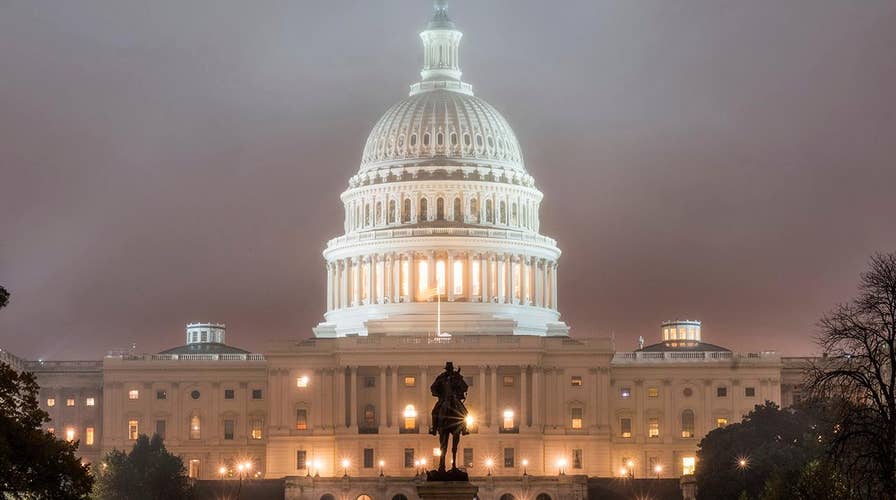Congress finalizes new leadership
Mitch McConnell expected to remain Senate majority leader as Nancy Pelosi eyes House Speaker role; Mike Emanuel reports from Capitol Hill.
Millions of us have complained for years about the partisan paralysis that keeps Congress from working effectively to get things done for the American people. The situation may worsen in January when Democrats assume majority control of the House, while the Senate remains under Republican control.
But divided government doesn’t have to result in gridlocked government.
There is one sure-fire way to get the “do-nothing” Congress to do something. Lawmakers need to break the excess power of the extreme wings of the Democratic and Republican Parties that too often block congressional action.
The best way to do this is to end the stranglehold the majority party leaders in the House and Senate have on which bills come to a vote in each chamber. This can be accomplished by adoption of rules changes that would allow bills with widespread bipartisan support to reach the floor of each chamber for a vote – even when the majority of the party in power rejects calling for a vote.
In addition, amendments should also be allowed to come to a vote when they have significant bipartisan support.
The group No Labels originated these ideas for rules changes in June. If passed in the House, the rules changes would allow 290 members of the 435-member House to bring any bill to the floor for a vote. In addition, 20 Republican and 20 Democratic representatives would be able to force votes on amendments.
If enacted, these rules changes would create a second path outside the Democratic and Republican caucuses to get legislation before the House and pass bills with enough bipartisan support to win approval in the Senate and become law.
There’s a group in the House called the Problem Solvers Caucus that is fighting for these needed rules changes – and its members may even hold up the election of a new speaker of the House to force through approval of the changes. This could spell trouble for House Minority Leader Nancy Pelosi, D-Calif., in her campaign to become speaker again in January.
Nine of the Democratic members of the Problem Solvers Caucus have written to Pelosi and given her until next week to respond to their requests for change.
These Democrats are not staging sit-ins in Pelosi’s office. They are duly elected representatives using their constitutional power and prerogative to bring much needed change. Rules changes may seem boring, but they are extraordinarily important to getting things done.
The last time an action like this occurred was in 1923, when progressive Republicans pushed for and won rules changes that were designed to get bills out of House committees, where the committee chairs were bottling up bills they opposed.
Today the problem is that splinter groups in both the Republican and Democratic caucuses can stop compromises that have majority support from ever reaching the floor. The Tea Party members were effective at this when the Republicans were in power. On the Democratic side, we could see the reverse with the growing power of the Congressional Progressive Caucus.
Polls show that the American people give Congress a 20 percent approval rating for the simple reason that lawmakers fight, finger-point and then never solve big problems like health care and immigration – even though there are compromises to be reached.
Too many in Congress would rather have a partisan issue to take to the next election than a problem solved. This is because House members face an endless merry-go-round of elections every two years, forcing them to begin campaigning for the next election soon after they are sworn in for each new term.
As a result, congressional inaction is at the core of the public’s dissatisfaction with government.
While the new activist left of the Democratic Party is drawing media attention – witness the many news stories about Rep.-elect Alexandria Ocasio-Cortez of New York – the hard work and the heavy lifting to accomplish things in Congress is being done by moderates who are on the verge of major reforms.
The framers of our Constitution did not foresee the growth and power of political parties. They would be surprised to see that in the modern age power has become even more centralized with the leadership of each party in Congress, while dedicated splinter groups have been effective at preventing needed compromises.
Too often, the extreme right on the Republican side and the extreme left on the Democratic side refuse to budge and find a middle ground that will enable Congress to pass legislation.
If members of the Problem Solvers Caucus win approval of their proposed rules changes, they will achieve the single most important reform in years to enable members Congress to break the gridlock and better serve the American people who elected them.
Editor’s note: The author’s wife is the volunteer chair of the group No Labels.





















